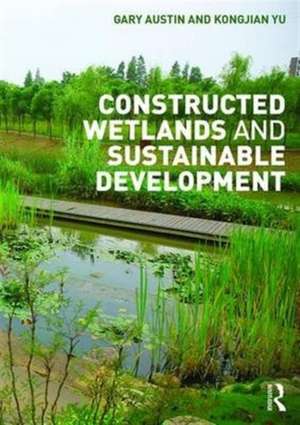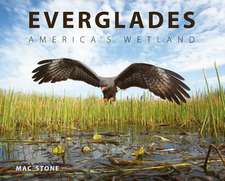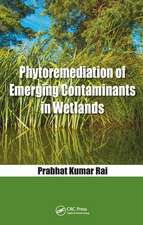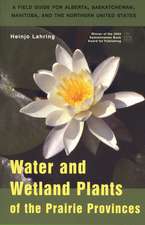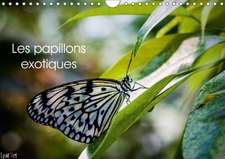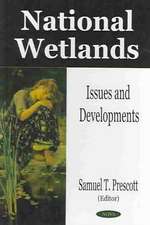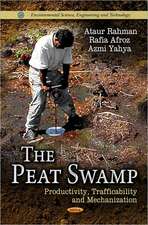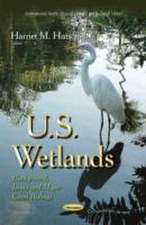Constructed Wetlands and Sustainable Development
Autor Gary Austin, Kongjian Yuen Limba Engleză Paperback – 26 aug 2016
Sections address resource management (landscape planning), technical issues (environmental engineering and botany), recreation and physical design (landscape architecture), and biological systems (ecology). Site and municipal scale strategies for flood management, storm-water treatment and green infrastructure are illustrated with case studies from the USA, Europe and China, which show how these principles have been put into practice.
Written for upper level students and practitioners, this highly illustrated book provides designers with the tools they need to ensure constructed wetlands are sustainably created and well manage
| Toate formatele și edițiile | Preț | Express |
|---|---|---|
| Paperback (1) | 461.82 lei 3-5 săpt. | +28.05 lei 10-14 zile |
| Taylor & Francis – 26 aug 2016 | 461.82 lei 3-5 săpt. | +28.05 lei 10-14 zile |
| Hardback (1) | 1212.96 lei 3-5 săpt. | +34.12 lei 10-14 zile |
| Taylor & Francis – 31 aug 2016 | 1212.96 lei 3-5 săpt. | +34.12 lei 10-14 zile |
Preț: 461.82 lei
Preț vechi: 501.98 lei
-8% Nou
Puncte Express: 693
Preț estimativ în valută:
88.37€ • 92.51$ • 73.12£
88.37€ • 92.51$ • 73.12£
Carte disponibilă
Livrare economică 15-29 martie
Livrare express 04-08 martie pentru 38.04 lei
Preluare comenzi: 021 569.72.76
Specificații
ISBN-13: 9781138908994
ISBN-10: 1138908991
Pagini: 301
Ilustrații: 268
Dimensiuni: 174 x 246 x 19 mm
Greutate: 0.66 kg
Ediția:1
Editura: Taylor & Francis
Colecția Routledge
Locul publicării:Oxford, United Kingdom
ISBN-10: 1138908991
Pagini: 301
Ilustrații: 268
Dimensiuni: 174 x 246 x 19 mm
Greutate: 0.66 kg
Ediția:1
Editura: Taylor & Francis
Colecția Routledge
Locul publicării:Oxford, United Kingdom
Public țintă
Postgraduate, Professional, and Professional Practice & DevelopmentCuprins
1. Water and Sustainable Urban Design, 2. Wastewater Characteristics, 3. Free Water Surface Constructed Wetlands, 4. Horizontal Subsurface Flow Treatment Wetlands, 5. Vertical Subsurface Flow Treatment Wetlands, 6. Hybrid Constructed Wetlands, 7. Plants in Constructed Wetlands, 8. Riparian Wetlands, 9. Stormwater Management and Sustainable Development, 10. Increasing the Sustainability of Agriculture, 11. Treatment of Industrial Effluent in Constructed Wetlands, Appendix
Notă biografică
Gary Austin is the author of Green Infrastructure for Landscape Planning (Routledge 2014). He is a landscape architect who studied under John Lyle and taught at the California State Polytechnic University, Pomona, USA. He has practised in the public and private sectors and has taught landscape architecture at the University of Washington, USA, and the University of Idaho, USA. His teaching and research focus on community revitalization, urban biological diversity and treatment of wastewater and stormwater for water quality improvement.
Kongjian Yu is co-author of the influential book The Art of Survival (2007). He is Visiting Professor of Landscape Architecture at Harvard University, USA, and the principal of Turenscape, a large landscape architecture firm in China. The many constructed and monitored wetland projects that his firm has designed appear in this book. He is also Professor and Dean at Beijing University, China.
Kongjian Yu is co-author of the influential book The Art of Survival (2007). He is Visiting Professor of Landscape Architecture at Harvard University, USA, and the principal of Turenscape, a large landscape architecture firm in China. The many constructed and monitored wetland projects that his firm has designed appear in this book. He is also Professor and Dean at Beijing University, China.
Recenzii
‘What do you need to know about constructed wetlands? It’s probably here. The authors cover benefits, design, plantings, ecology, and more. With a target audience of upper-level students and practitioners, this extensively illustrated book does have a tendency to get into the weeds of the topic (Sample sentence: "Swans, geese, many species of ducks, and king rail eat the plant’s seeds and tubers, while muskrat, beaver, and porcupine eat the tubers."). But they’re wetland-friendly weeds.’
Landscape Architecture Magazine
Landscape Architecture Magazine
Descriere
This book explains how with careful planning and design, the functions and performance of constructed wetlands can provide a huge range of benefits to humans and the environment.
